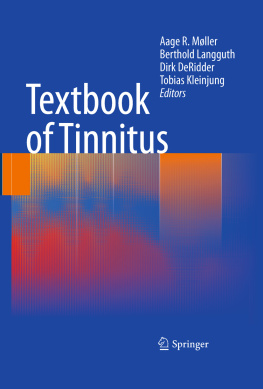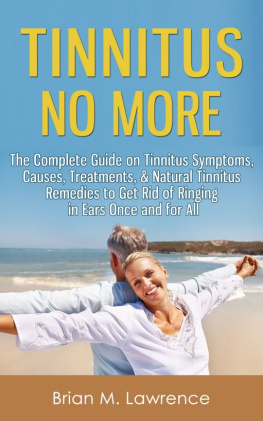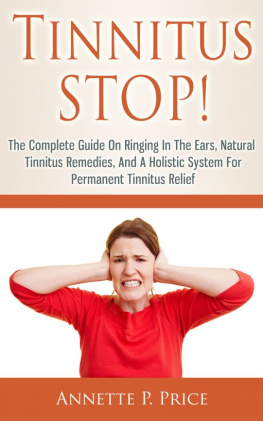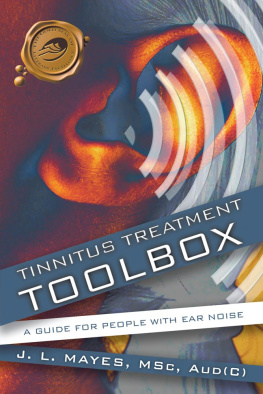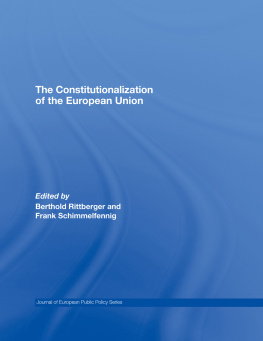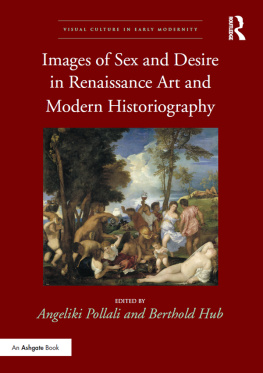Aage R. Mller , Berthold Langguth , Dirk De Ridder and Tobias Kleinjung (eds.) Textbook of Tinnitus 10.1007/978-1-60761-145-5_1 Springer Science+Business Media, LLC 2011
1. Introduction
Introduction
Tinnitus can affect the entire life of an individual, can prevent intellectual work, and impair the quality of life in general; in some instances, tinnitus can cause suicide. Severe tinnitus is often accompanied by hyperacusis and affective disorders such as phonophobia and depression.
Tinnitus and auditory hallucinations are perceptions of sounds in the absence of external noise. Subjective tinnitus and hallucinations are phantom sounds. Tinnitus is different from hallucinations and objective tinnitus that is caused by sounds generated in the body and conducted to the ear. Tinnitus is hearing of meaningless sounds. Hallucinations consist of meaningful sounds such as music or speech and occur in schizophrenia, after intake of certain drugs, and it may occur (rarely) in temporal lobe disorders. This book will not cover hallucinations.
There are two main kinds of tinnitus, namely, objective and subjective tinnitus. Objective tinnitus is caused by sounds generated in the body and conducted to the ear. It may be caused by turbulence of blood flow or muscle contractions. Individuals with subjective tinnitus have no visible signs of disease, and the disease has few detectable physical correlates. Objective tinnitus may be detected by an observer using auscultation, whereas subjective tinnitus can only be observed by the person who has the tinnitus.
Subjective tinnitus can have many forms: it can be high frequency sounds similar to the sounds of crickets, like a high- or low-frequency tone, and constant or pulsatile. Tinnitus can be present at all times or can appear only sometimes. However, it is usually not possible to relate a specific event to the appearance of tinnitus.
Patients description of their symptoms is the only cue, and this may be misleading because they point to the ear, which is rarely the site of the pathology. It is abnormal neural activity in the brain that causes subjective tinnitus. This abnormal neural activity may originate in the ear but it is more likely generated somewhere in the brain.
There are two ways in which abnormal neural activity that may be interpreted as a sound can occur in the brain. One is through neural activity in the periphery of the auditory system that emulates the activity elicited by sound, which reaches the ear. The other way is through abnormal neural activity generated somewhere in the ascending auditory pathways. The way the neural activity that causes tinnitus is generated is not known in detail, but recent studies indicate that the activity is different from that elicited by sound stimulation, which means that the different forms of tinnitus may be generated in different ways.
There is evidence that tinnitus, after some time (chronic tinnitus), becomes fundamentally different from acute tinnitus. This change over time is important for treatment of tinnitus, and there is evidence that treatments are less effective after tinnitus has persisted for more than 5 years [].
Tinnitus is not perceived in the same way as normal physical sounds, and there are indications that the way tinnitus is perceived has to do with perception of self (see ].
It is not known where in the nervous system sensory activation reaches conscious awareness, and neural activity in other parts of the CNS than that of normal sounds may give rise to the tinnitus sensation. It is not known what features of neural activity are important for eliciting awareness of a sensory signal, and even less is known about which kind of neural activity causes awareness of tinnitus (see ].
Contemporary understanding of which qualities of neural activity gives awareness of sensory stimulation includes neural synchrony, coherence of activity in many neurons in cortical or other structures, and neural connectivity. There is considerable evidence that activation of neural plasticity plays an important role in many forms of tinnitus (see ], where the symptoms are caused by plastic changes that are not beneficial to an individual person.
Sensory awareness and affective reactions (distress) are probably caused by different kinds of neural activity and probably occur in different parts of the CNS.
Such separation of perception is known for pain, where the lateral tract of the spinothalamic system produces awareness while the medial system produces the affective and emotional reaction to pain and activates distress networks.
More recently, some abnormal physiological signs have been found to be abnormal in individuals with some forms of tinnitus. One abnormality is with regard to the high-frequency component of electroencephalographic (EEG) recordings, known as gamma activity (see ].
The signs of tinnitus at a local anatomical level are often different from those of a global brain level, and there are indications that non-auditory regions of the brain are activated abnormally in some forms of subjective tinnitus (see ).
Also, animal experiments have shown evidence of non-auditory structures, for example, the hippocampus, being involved [].
The degree and the impact of tinnitus on an individual person vary widely for the different kinds of tinnitus and also from person to person. It often fluctuates over time and with differing circumstances. Tinnitus is common, but only in a relatively few individuals does it cause distress or other problems. Many people who do not have tinnitus under normal environmental circumstances will experience tinnitus when placed in a room that is silent, such as the test rooms used for audiological testing.
Tinnitus is a phantom sensation of different kinds of sounds, but rarely are these sounds comparable with natural sounds or even with sounds that can be synthesized electronically.
Different methods have been used to estimate the intensity (loudness) of tinnitus. Visual analog scales have been used to estimate the strength of tinnitus, but methods such as loudness balance often give results that are unrealistically low []. The results of loudness matching show that most forms of tinnitus have loudness in the range of 20 dB even in situations where the tinnitus is regarded to be unbearable.
The effect of tinnitus on an individual person varies, and the degree of annoyance is not directly related to the perception of tinnitus. Like the impact of severe pain depends on whether it is regarded to be escapable or inescapable, also the impact of tinnitus on a persons quality of life largely varies. Studies have indicated that inescapable and escapable pain involved different lamina of the PAG [].
While tinnitus is described as a sound, similar sensations cannot be evoked by sound stimulation and it is assumed that the neural activity that causes tinnitus is different from that evoked by sound stimulation. The abnormal neural activity that causes tinnitus cannot be detected by imaging methods that are available. Some physiological methods can provide some insight in abnormal neural activity, but most of these methods are restricted to use in animals.

